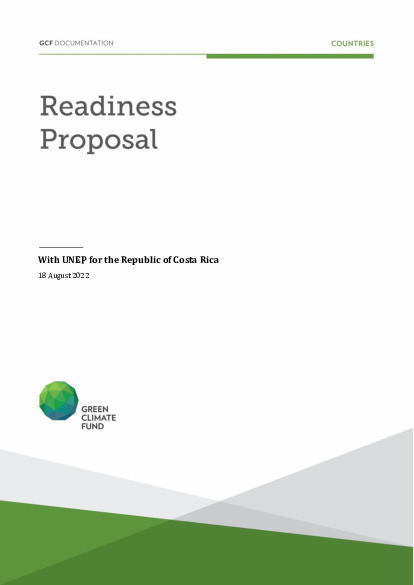Aligning financial flows of the financial sector in Costa Rica with the Paris Agreement climate change goals

Aligning financial flows of the financial sector in Costa Rica with the Paris Agreement climate change goals
Costa Rica’s National Decarbonization Plan (NDP) 2018-2050 - commits to net-zero emissions by 2050 and provides a clear roadmap towards the decarbonization of the economy. Also, its nationally determined contribution (NDC) is a public policy commitment to achieving a low-carbon and resilient development.
With these long-term commitments, the government is aiming to align financial flows consistent with the country’s NDC and NDP goals. However, financial sector actors are in an incipient stage of integrating climate change and broader sustainability concerns into their investment decisions and portfolio allocations because they have not engaged in the climate finance mobilization. There is a lack of regarding climate finance mobilization and how the private sector can engage in sustainable investments or economic activities, that are science-based and consistent with a net-zero economy by 2050. At the same time, the financial sector is exposed to climate risks (physical risks), especially via credit operations and increasing insurance claims. Also, decarbonization commitments result in additional legal and regulatory frameworks, which are likely to change the outlook of investments threatening companies that are not prepared to transition to a net-zero economy (transition risks).
Therefore, financial regulators and supervisors such as the Central Bank (BCCR), the Superintendency of Financial Institutions (SUGEF), and the Superintendency of Insurance Companies (SUGESE) have taken action to identify and assess the challenges and opportunities of climate change into the macroeconomic and financial stability. As such, SUGEF is currently monitoring, reporting and verifying (MRV) climate financial flows from financial institutions in their credit operations, through the SICVECA platform. Also, the BCCR has launched the 2020-2023 Strategic Plan which has a line of action to: Integrate climate change risks into financial stability monitoring and prudential supervision; for improving the understanding of the risks associated with climate change for the financial system.
Despite these climate policies and financial regulatory commitments and advancements, it is necessary to accelerate the pace and furnish the financial sector with the methodologies and tools that will accelerate the decarbonization (and its financing). Hence, this proposal aims to provide relevant technical assistance for: (1) the development of its GCF Country Programme, (2) the assessment of climate finance flows (taxonomy); (3) the identification, measurement, and disclosure of climate-related financial risks; (4) the development of a concept note by mainstreaming climate change in the financial sector. This will: (1) improve the contribution of private finance flows to low-emission and resilient development, and (2) strengthen financial stability by incorporating climate factors into investment decision making.
The proposal will work with relevant financial actors; the main beneficiaries are the regulators and supervisors such as the BCCR, SUGEF, and SUGESE which are already involved and fully working on climate financial flows and climate risks. The private financial actors such as the banking association (ABC) and the insurance association (AAP) have a prominent role by using the methodologies and tools. Overall, this proposal focuses on the financial sector due to its fundamental role in financial intermediation and investment in climate change, and its contribution to the macroeconomic and financial stability.